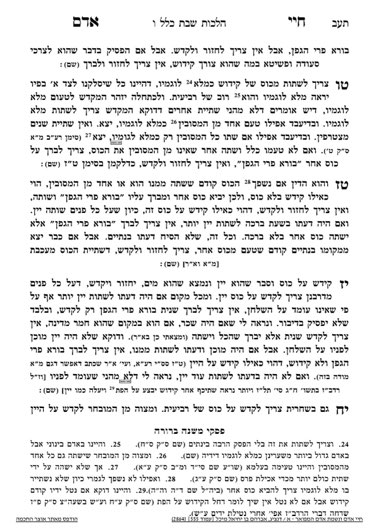The current series, which will cover Maariv on Friday night and Kiddush, is available for sponsorship. Please contact Rabbi Reingold for more information.
We are beginning siman 15. The Chayei Adam writes that if one is presented with a kos shel bracha, they must drink from it in a significant way. The Chayei Adam defines this amount as approximately a melo lugmav, the amount that if one were to move the liquid in their mouth to one side, their cheek would bulge. This amount is assumed to be a rov of a revi’is.
The Piskei Mishnah Berurah points out that the exact wording used in the poskim is his melo lugmav, because it actually depends on the person. The assumption of rov revi’is is for an average person; a larger person would require more.
It is hard to measure this amount, but it is brought down that a melo lugmav is half the amount of liquid a person could hold in their mouth in totality. It is actually known as k’melo lugmav, approximately a full cheeks’ worth, because when one fills up one cheek in totality it gives the impression that the entire mouth is full (a melo lugmav actually means a full mount of water, while this is only half of that).
The best way to measure a melo lugmav is for a person to fill up their mouth as much as possible with water, spit it out into a measuring container, and then divide by half.
This amount is relevant for Yom Kippur, as the issur deoraysa with a chiyuv kareis of drinking is to drink a melo lugmav. Since it is an issur deoraysa, we do not simply assume that an individual’s melo lugmav is a rov revi’is, but it depends on the individual. This shiur applies to a person who needs to remain hydrated over Yom Kippur, but does not need to drink a large amount at a time (if they need to drink large amounts, this advice does not apply).
When it comes to issurim, we have a concept of hakal kal kodem. That means, even when there is a heter to transgress an aveirah to save a life, if one has the option, we prefer to transgress a more lenient aveirah rather than a more stringent one. For example, if one’s life can be saved through eating chazir, which is a lav, rather than cheilev, which is kareis, they must eat the chazir. Thus, over here, although any amount of food or drink is considered an issur deoraysa (due to the concept of chatzi shiur assur min hatorah), drinking less than a melo lugmav considered more lenient, because it does not carry the chiyuv of malkus and kareis for its transgression. In order to avoid an issue of tziruf (the small amounts adding up), one must take a break equivalent to k’dei achilas peras in between each drink.
The Chayei Adam continues, and writes that lechatchilla, the person making kiddush should drink the melo lugmav. If that is not possible, someone else can drink the melo lugmav. If that is still not possible, the amount of melo lugmav can be split among those listening to kiddush.
Summary
- Lechatchilla, the person making kiddush should drink a melo lugmav of the kos.
- If that is not possible, another person should drink a melo lugmav.
- If that is not possible, the melo lugmav should be split between those listening to kiddush.
- A melo lugmav is calculated depending on the individual. The best way to calculate it is to fill up one’s mouth with water, spit it into a measuring utensil, and divide by half.



